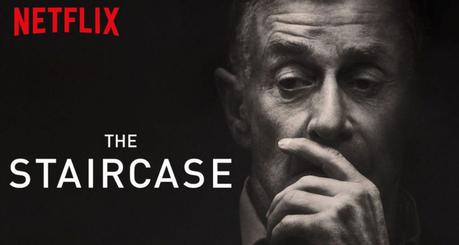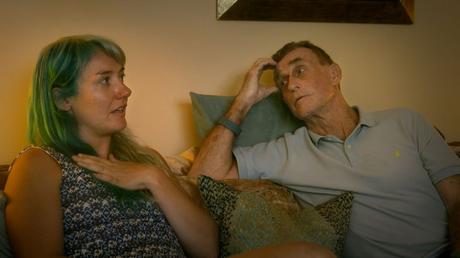In 2001, French director Jean-Xavier de Lestrade released Murder on a Sunday Morning, an enraging documentary about a 15-year-old black kid being wrongfully accused of murdering two tourists in Jacksonville, Florida. It would later win the Academy Award for Best Documentary, by which point de Lestrade had already moved on to his next project: The Staircase, which was intended to be a companion piece to Murder on a Sunday Morning. If that was the story of racial prejudice in the criminal justice system The Staircase was to be the contrasting story of a rich white guy's experience in that same system.
Except - and huge spoiler alert - things didn't go according to plan. Michael Peterson, an eccentric Vietnam War veteran, author, newspaper columnist, and father of 4, was found guilty of murdering his wife Kathleen at the bottom of a staircase in their Durham, North Carolina home. What was meant to be a documentary culled from two years of following the Peterson family around and observing his high-powered legal team at work, both in and out of the courtroom, quickly turned into a decade-long ordeal where Lestrade and his team repeatedly revisited Peterson's ongoing journey through the courts and added new episodes to The Staircase. The eight initial episodes, which won de Lestrade a Peabody, has now grown to 13 total, with 3 new and presumably final ones added on Netflix's dime.

For true crime aficionados, this is nothing new. The Staircase is, after all, the granddaddy of the true-crime mini-series. Before Making a Murderer, Serial, The Jinx, Wormwood, or countless other recent examples in the rapidly expanding subgenre, there was The Staircase, launching alternate theories about how exactly Kathleen died. Michael says she fell down a narrow staircase, hit her head, and bled to death. The State says he strangled and bludgeoned her to death after she discovered his infidelity. Superfans of the documentary have long contended - seriously - that maybe an owl flew into the house and caused her fall as well as the mysterious lacerations to her skull.
However, in truth, these kinds of documentaries have remained a blind spot for me for quite some time. Sure, I devoured Jinx, but I only made it an episode into Wormwood, which mixes recreations featuring well-known actors with documentation. Until hearing the new Netflix episodes discussed on the Shock Waves podcast, I hadn't heard of The Staircase before. Heck, I watched the entirety of NBC's Trial & Error sitcom last year completely clueless to just how much of it was pulled from The Staircase.
Yet the moment I started The Staircase over the weekend I was sucked into it for all the same reasons everyone else is when they watch a show like this: the melding of murder mystery and human drama is too enticing to resist. Plus, de Lestrade's fly-on-the-wall style and remarkable level of access puts us in the room at every important moment. Also, damn, this case just kept weirder and weirder with one twist after another that not even a Law&Order writer could top.
By the end of the trial, we get swept up in the Petersons' arrogant assumption of a guaranteed acquittal (as pictured below, during jury deliberations we see Michael and one of his adopted daughters discuss taking an international road trip together) and share in their confusion over what appears to be a miscarriage of justice motivated by Southern prejudice ( spoiler: over the course of trial we learn Peterson is bisexual and regularly slept with male prostitutes outside the marriage, which is painted in a rather homophobic light by the prosecutors).
That, of course, eventually proves to be The Staircase's undoing. While it seems to start out as a neutral observation of a complicated case, de Lestrade and his team gradually gravitate toward taking Peterson's side (the titles for each episode are definitely prejudiced against the prosecution) and thus skim over some important facts of the case. That's why there's now a website which seeks to fill in some of the blanks and at least help viewers understand why Kathleen's two sisters and one daughter from a prior relationship still and quite vigorously argue Peterson is guilty.
The newer episodes see old evidence being invalidated, the discovery of a truly corrupt State Bureau of Investigations, and, finally, a resolution for Peterson, his family, and Kathleen's family. However, even at the end Peterson's attorney David Rudolf admits to not knowing with 100% certainty that Michael didn't do it. In interviews promoting the documentary, even Lestrade has said as much, and in one of the new Netflix episodes, Peterson appears to contradict himself, seemingly (and quite casually) admitting Kathleen didn't actually know about his bisexuality or affairs even though he's argued otherwise for over a decade.
Thus, the question of what exactly happened to Kathleen Peterson back in December 2001 remains. Much of what the State offered as evidence has been invalidated, but at the same time, there are peculiarities in Michael's side of the story as well.
This lack of concrete closure can be frustrating, yet part of The Staircase's legacy as a pre- Making a Murderer documentary is that it is far more beholden to the older way of telling these stories than the more activist-minded generation. Lestrade certainly doesn't lay out any traps for his subjects like the The Jinx team did. Instead, as The Atlantic argued:
Lestrade simply watches, and captures what he sees. His unwillingness to interject-to help shape a narrative, or even pay lip service to information that doesn't surface organically in scenes-can be frustrating, and it opens The Staircase up to questions about its journalistic integrity. But de Lestrade has made something different: not a classic true-crime investigation, but a strange, sad portrait of cultural fault lines and their consequences.
Thus, The Staircase is at its most affecting in those moments when it observes Michael Peterson's adopted daughters, always sitting behind him court, always hopeful to have him home again and for life to finally move on, and, sadly, always in for a deep, soul-crushing disappointment. Or when you see David Rudolf take the initial guilty verdict harder than Michael, slumping over in court and later expressing to having his faith in humanity irrevocably shaken in that moment. Or in those rare moments when Kathleen's sisters speak on camera and appear to actually get angrier over the years, their grief forever burning bright, to the point of causing one unflattering after another.
The Staircase, at this point, is not a documentary about a murder. It's not even about Kathleen Peterson. It's about the human cost visited upon the survivors of tragedy and the maddening realities of a deeply flawed justice system. Even the judge in the case admits in the new Netflix episodes to having regrets over how he handled the first trial. Since most of the screen time is devoted to Peterson's side he is the one who is ultimately painted as the victim, but by the end, it is clear all involved parties were wrecked by this event and will never be the same.

Near the end, a hopeful Michael phones one of his adopted daughters and naively floats the idea of them someday reuniting with Kathleen's daughter, who they once thought of a sister but have been estranged from ever since the start of the first trial. You know the answer before the daughter even speaks: some relationships can't be fixed. The Staircase doesn't solve a murder mystery, but it masterfully showcases one family's journey through tragedy and subsequent separation. Any commentary about Southern prejudice or the justice system is ultimately secondary to the far more powerful imagery of weeping daughters who just want their dad back and outraged sisters who just want justice for their sister.

